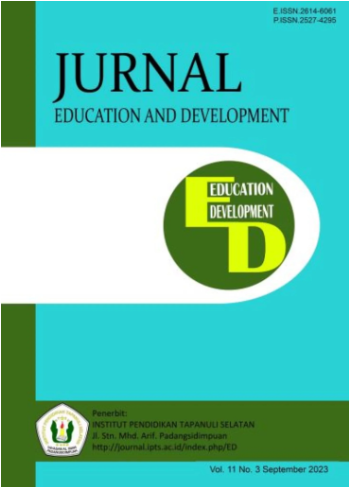IMPLEMENTATION OF THE PROGRAM KELUARGA HARAPAN IN IMPROVING COMMUNITY WELFARE IN RIMBA SOPING VILLAGE PADANGSIMPUAN ANGKOLA JULU DISTRICT
Main Article Content
Abstract
The profession of most of the people of Rimba Soping Village is farming. But they do not own their own land or work as farm laborers on other people's land. The increasing cost of living necessities means that many of them still need assistance from the government, such as assistance from the Program Keluarga Harapan (PKH). The aim of the Program Keluarga Harapan (PKH) is to improve the welfare of the people of Rimba Soping Village. The aim of this research is to analyze the implementation of the Program Keluarga Harapan (PKH) in improving the welfare of the community in Rimba Soping Village and what factors hinder the implementation of the Program Keluarga Harapan (PKH). This research uses descriptive research methods with a qualitative approach. The results of this research show that financial assistance from the government has not been completely successful in improving welfare, but on the other hand it can meet the daily needs of the people who receive the Program Keluarga Harapan (PKH) assistance. Factors that hinder the implementation of PKH are the education of the head of the family which is still low, the income earned from working as farmers is still low because they are only farm laborers, population growth is quite high compared to other villages in the same sub-district. Then, the implementation of the Program Keluarga Harapan (PKH) has not gone well, because there are still many obstacles in terms of the accuracy of the nominal amount and the timing of disbursement of funds, as well as assistance for school-age children's education costs not being used optimally.
Article Details

This work is licensed under a Creative Commons Attribution-NonCommercial-ShareAlike 4.0 International License.
References
Dwiyanto, Indiahono. 2015. Kebijakan Publik Berbasis Dynamic Policy Analisys. Grava Media.
Fadillah, Putra. 2013. Paradigma Kritis Dalam Studi Kebijakan Publik. Jakarta : Pustaka Pelajar
Indrawati, Putri Ayu dan Agus Satmoko Adi. 2018. Partisipasi Masyarakat Dalam Implementasi Kebijakan Program Keluarga Harapan (Studi tentang Fasilitas Kesehatan dan Fasilitas Pendidikan Keluarga Penerima Manfaat di Desa Juwet, Kecamatan Kunjang, Kabupaten Kediri). Jurnal Kajian Moral dan Kewarganegaraan. Vol. 6 (3) : 321-335.
Kholif, K.I., I. Noor dan Siswidiyanto. 2015. Implementasi Program Keluarga Harapan Dalam Upaya Pengentasan Kemiskinan di Kecamatan Dawarblandong Kabupaten Mojokerto. Jurnal Administrasi Publik (JAP).
Martono, Nanang. 2019. Metode Penelitian Kuantitatif : Analisis Isi dan Analisis Data Sekunder. Jakarta : PT. Raja Grafindo Persada.
Parwoto. 2001. Kemiskinan. Bappenas.
Silalahi, Uber. (2009). Metode Penelitian Sosial. Bandung : PT. Refika Aditama.
Subarsono, AG. 2019. Analisis Kebijakan Publik : Konsep, Teori dan Aplikasi. Jakarta : Pustaka Pelajar.
Wahdaniah, A., Budi Setiawan dan Muhammad Tahir. 2022. Impelemtasi Program Keluarga Harapan (PKH) Era Covid-19 Di Desa Latellang Kecamatan Patimpeng Kabupaten Bone. Jurnal KIMAP : Kajian Ilmiah Mahasiswa Administrasi Publik. Vol 3 (1).
Wahab, Solichin A. 2015. Pengaturan Analisis Kebijakan Dari Formulasi Ke Implementasi Kebijakan Negara. Malang : Bumi Aksara.

